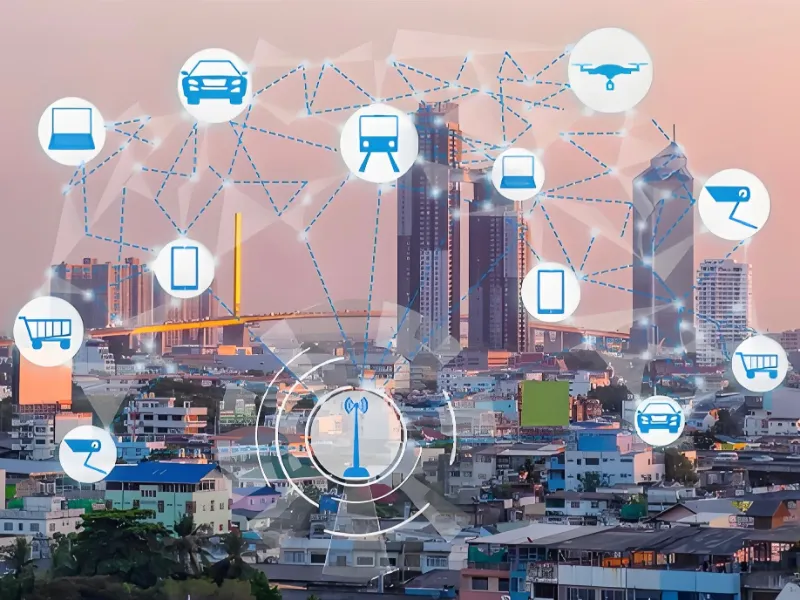- Smart city has a higher quality of life for residents, fostering community engagement and inclusivity.
- Adaptive management practices allow cities to refine strategies, incorporate new technologies, and respond to changing conditions.
Smart cities are an innovative approach to urban management that combines technology, sustainability and community engagement to create a more efficient and livable urban environment, playing an important role in shaping future urban life and driving economic growth. In this blog, we will explore the characteristics and advantages of smart cities and discuss strategies for amplifying their benefits.
Characteristics of smart cities
1. Integration of technology and data: Smart cities utilise a variety of technologies, including Internet of Things (IoT) devices, sensors, and data analytics, to gather and analyse information in real-time. This data-driven approach allows for more informed decision-making and streamlined operations.
2. Sustainability focus: These cities prioritise sustainable practices, such as reducing energy consumption, minimising waste, and improving public transportation. Green technologies, renewable energy sources, and efficient waste management systems are integral components.
3. Enhanced connectivity: Smart cities boast advanced communication networks, including high-speed internet and 5G connectivity. This infrastructure supports a range of applications, from smart grids to connected vehicles.
4. Citizen engagement: Engagement platforms and apps are designed to involve residents in decision-making processes and allow them to provide feedback on city services and infrastructure.
5. Resilience and adaptability: Smart cities are designed to be adaptable to changing conditions and resilient to challenges such as climate change, economic fluctuations, and population growth.
Also read: Smart city solutions: shaping urban life with technology
Advantages of smart cities
Enhanced public services, such as cleaner air and water, efficient transportation, and better healthcare, lead to a higher quality of life for residents. Smart cities also foster community engagement and inclusivity.
By attracting businesses and investments, smart cities stimulate economic development. Technology-driven industries, improved infrastructure, and efficient services create a conducive environment for economic growth.
Smart cities also contribute to environmental conservation through energy efficiency, waste reduction, and the promotion of green technologies. This focus on sustainability helps mitigate the impact of urbanisation on the environment.
Automation and data-driven decision-making streamline city operations, reduce costs, and improve service delivery. Efficient resource management leads to better allocation of public funds and enhanced operational effectiveness.
The ability to adapt to challenges and recover from disruptions is a key advantage. Smart cities use technology to build resilience against natural disasters, economic shifts, and other unforeseen events.
Also read: Revolutionising urban life: The power of smart city technologies
Strengthening the advantages of smart cities
1. Invest in infrastructure: Upgrading communication networks, such as deploying 5G and expanding broadband coverage, is crucial for supporting smart city applications. Investments in resilient and scalable infrastructure ensure that technology can be effectively utilised.
2. Promote interoperability: For smart city solutions to be effective, different systems and technologies must work seamlessly together. Establishing standards and fostering collaboration between various stakeholders can enhance interoperability and integration.
3. Foster public-private partnerships: Collaboration between government agencies, private companies, and community organisations can drive innovation and accelerate the implementation of smart city projects. Public-private partnerships leverage resources and expertise from multiple sectors.
4. Ensure data privacy and security: As smart cities rely heavily on data, safeguarding privacy and ensuring robust security measures are essential. Implementing strong data protection policies and technologies can build trust among residents and encourage greater participation.
In the meantime, emphasising green technologies, such as renewable energy sources and energy-efficient infrastructure, can enhance the sustainability of smart cities. Encouraging research and development in smart technologies and solutions can drive continuous improvement. Regular assessment of smart city projects and their outcomes is essential for identifying areas of improvement. Adaptive management practices allow cities to refine strategies, incorporate new technologies, and respond to changing conditions.

